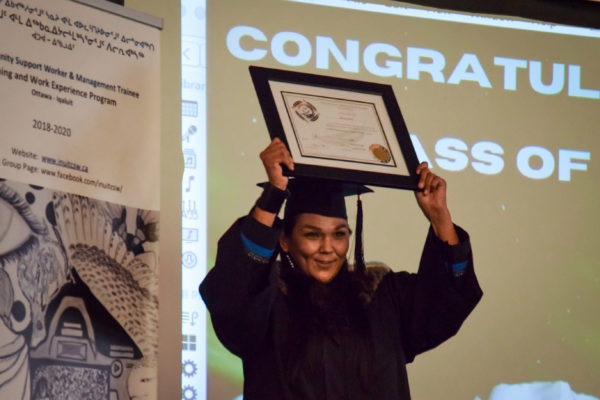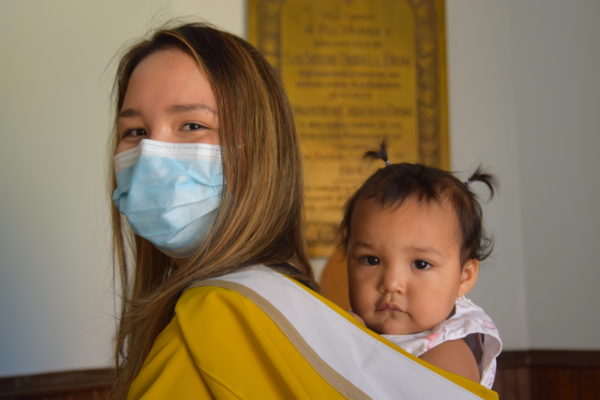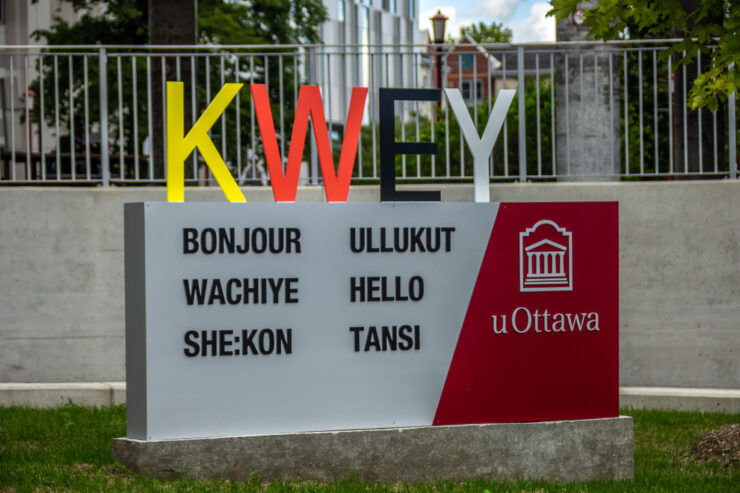Courses now available for students of all backgrounds
Echoing throughout the remnant stained glass of the former Sandy Hill All Saints Anglican Church on Sept. 17 was an emotional celebration of the first-ever diploma graduating class of the Inuit Community Support Worker and Management Trainee Program.
“This is my first time wearing a [graduation] gown,” said the teary-eyed graduate Oolooci Taukie, 41, one of the 10 Inuit graduates sitting with masks on. “This means a lot to me.”
Initially developed by the Iqaluit-based ilinniapaa Skills Development Centre (iSDC) and the Ottawa-based Tungasuvvingat Inuit (TI) in 2018, the jointly-run program offers various skill-based two-year long diploma programs and course certificates for Inuit of Ottawa and Nunavut.
All held online, the program aims to “remove barriers that stop many people from pursuing post-secondary education” particularly seen in the northern territories. It is also nationally accredited by the Indigenous Certification Board of Canada (ICBC) and receives funding from the Government of Canada’s Strategic Partnership Fund.
According to Statistics Canada’s 2016 census, 47.8 per cent of people in Nunavut between the ages of 25 and 64 had a high school diploma compared to 86.3 per cent in Canada. Additionally, the same group has only 14.3 per cent obtaining a bachelor’s degree or higher and 19.3 per cent with college, CEGEP or other non-university or diploma education.

“This program is so close to my heart,” said Taukie. “I have gone through a lot in my life such as trauma, addictions, and I know the feeling of hopelessness in the city especially for Inuit, First Nation and Métis peoples.”
Amanda Kilabuk, executive director of TI, said in a recent press release that the program is designed by Inuit to help Inuit “wherever they live and work and remove barriers to professional development and certification.”
“It also reduced any waiting times to access college programs, let the students remain with their families and provided the opportunity to set their own pace for learning based on family responsibilities.”
Having this flexibility was what drew Taukie to the program. Originally from Cape Dorset, Nunavut, she said her motivation began 10 years ago when she moved to Ottawa, experiencing the disparity, culture shock, and most often racism and isolation.
“I let home when I was 16 because I knew it was either commit suicide or try and make changes in my life,” she said. Taukie explained she had not graduated high school, and had been adopted by her elderly grandparents.
“Knowing what Inuit really need, the community support and understanding the whole cultural perspective, it’s a great motivation for me to help my people.”
Beyond TI and iSDC, curriculum content was also designed in collaboration with Elder Piita Irniq as a cultural advisor and national Inuit Residential Schools initiative representative and Deborah Tagornak for Inuktitut language and terminology integration.
Before the graduation ceremonies began, Taukie called to both Indigenous and non-Indigenous. “It’s very important to advocate for youth,” as she looked to her daughter Grace Salomomie across the table.
Salomomie is a University of Ottawa student who moved to Ottawa five years ago to reconnect with her mother after growing up in Cape Dorset and Iqaluit. “I am so proud of her,” she said of her mom. “The support that she is now able to [give] is really, really important.”
The U of O student said she is very grateful for the mentors that have supported her all along the way to post-secondary education. Salomomie recognizes that statistically, she is part of a demographic where only a handful attend university stemming from the impact of residential schools and different definitions of education between cultures.
For Helen Roos, president and lead facilitator of the iSDC, said the program offers something unique. Roos studied at the U of O for a PhD in Canadian history/Canadian studies but stepped away to assist in land claims when Nunavut was founded back in 1999.
“This is truly a first of its kind program, curricula and content, which is available for Inuit and those seeking to work with Inuit across a range of sectors from justice, education, health, mental wellness,” she said over email.
“You could be a PhD candidate or a grade three graduate, we don’t care,” she said.

Students of the program include Inuit from Ottawa, communities in Nunavut such as Cape Dorset, Iqaluit, Hall Beach, Pangnirtung, and Pond Inlet, N.U., as well as Labrador, N.L. The programs are now open to students of all backgrounds.
Greater than the number of hours for a standard diploma, Roos said the program is filling direct gaps in helping “democratize” access to education. Available courses include occupational health and safety, communications and administration, community development, history, reconciliation and healing, alongside a 2,000 hour practicum.

A key part in ensuring success, Roos said graduates have already secured positions within social services such as crisis and homeless shelters, health organizations and mental wellness including cultural identity programs.
“U [of] Ottawa students would benefit from learning about Canada’s North.” she wrote in the email to the Fulcrum. [Understanding] health and wellness, including inter-generational trauma alongside the exceptional resiliency of Inuit individuals, families and communities, is a shared history that students would benefit from learning and experiencing.”
Courses are available for registration online to anyone of all backgrounds which can be found on their website. Once the individual completes all the diploma requirements, they can apply for the diploma to the ICBC.





